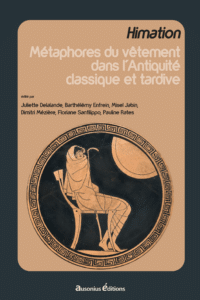UN@ est une plateforme d'édition de livres numériques pour les presses universitaires de Nouvelle-Aquitaine
Auteur : Georgia Panou

School of History, Classics and Archaeology
William Robertson Wing, Old Medical School, Teviot Place
Edinburgh, EH8 9AG UK
G.Panou-1@sms.ed.ac.uk
0000-0002-0540-4894
William Robertson Wing, Old Medical School, Teviot Place
Edinburgh, EH8 9AG UK
G.Panou-1@sms.ed.ac.uk
0000-0002-0540-4894
Georgia (Yolanda) Panou obtained her BA in Greek Philology at the National and Capodistrian University of Athens and her MA in Classics at the University of Strasbourg. She is currently a doctoral candidate in Classics at the University of Edinburgh (2019-2023). She has been a visiting student at the Ludwig-Maximilian University in Munich and the Scuola Normale Superiore in Pisa.
Her research interests include Greek tragedy, interpretation of classical mythology, the intrafamilial bonds and conflicts in classical Athens and the theatrical representation and staging of the violation of philia. At the moment, she is co-organizing an international conference entitled “Staging Emotions: Affect and emotional expressions in Euripides” at Leiden University.
Bibliography
-
Beaumont L.A. (2012), Childhood in ancient Athens: Iconography and social history, London & New York: Routledge.
-
Belfiore E. (2000), Murder among friends: Violation of philia in Greek tragedy, Oxford: Oxford University Press.
-
Blondell R., Gamel, M., Rabinowitz, N. S., and Vivante, B. (1999), Women on the edge: Four plays by Euripides, New York/London: Routledge.
-
Cairns D. (2016), “Mind, Body, and Metaphor in Ancient Greek Concepts of Emotion”, L’ Atelier du Centre de recherche historique 16 (16): 2-18.
-
Canevaro L.G. (2018), Women of Substance in Homeric Epic: Objects, Gender, Agency, Oxford: Oxford University Press.
-
Chaniotis A. (2012), Unveiling Emotions: Sources and Methods for the Study of Emotions in the Greek World, Stuttgart: Steiner Verlag.
-
Chesi G.M. and Spiegel F. (2020), Classical Literature and Posthumanism, London/New York: Bloomsbury Academic.
-
Cox C.A. (1998), Household interests: Property, marriage strategies, and family dynamics in ancient Athens, Princeton: Princeton University Press.
-
Foley H.P. (2002), Female Acts in Greek Tragedy, Princeton: Princeton University Press.
-
Griffiths E.M. (2020), Children in Greek Tragedy: Pathos and Potential, Oxford: Oxford University Press.
-
Michelini A.N. (1987), Euripides and the Tragic Tradition, Madison: University of Wisconsin Press.
-
Mueller M. (2016), Objects as Actors: Props and the Poetics of Performance in Greek Tragedy, Chicago: Chicago University Press.
-
Ringer M. (2016), Euripides and the boundaries of the human, Lanham/Maryland: Lexington Books.
-
Stanford W.B. (1983), Greek Tragedy and the Emotions: An Introductory Study, London: Routledge.
-
Telò M. and Mueller M. (2018), The Materialities of Greek Tragedy: Objects and Affect in Aeschylus, Sophocles, and Euripides, London: Bloomsbury.
-
Worman N. (2020), Tragic Bodies: Edges of the Human in Greek Tragedy, Bloomsbury Academic.
par Georgia Panou
This paper explores the notion of enveloping death through the use of metaphorical as well as literal “wrappings” in Euripides’ Heraklēs.


